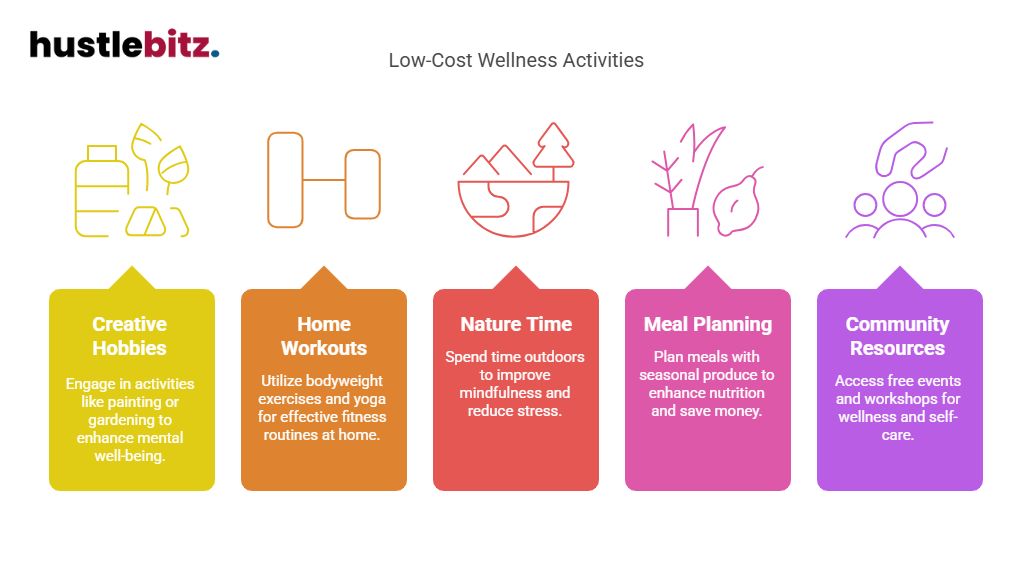Affordable self-care is vital for achieving well-being while on a budget. Numerous low-cost options enhance mental and physical health, such as bodyweight exercises, meditation, and creative hobbies like painting and gardening. Engaging with nature, whether through hiking or simply spending time in a park, offers significant benefits to both mood and mindfulness. Additionally, budget-friendly nutrition choices, like seasonal produce and home-cooked meals, can foster a healthier lifestyle. Many local libraries and community centers provide free resources and programs aimed at enhancing self-care. Explore these avenues further to discover even more practical self-care strategies.
Key Takeaways
- Engage in low-cost creative hobbies like painting or gardening to boost mental well-being and foster connections with others.
- Utilize bodyweight exercises and yoga at home for effective workouts without the need for expensive equipment.
- Spend time in nature to enhance mindfulness, reduce stress, and promote overall physical health at no cost.
- Meal planning and incorporating seasonal produce can improve nutrition while keeping food expenses low.
- Take advantage of free community events, local library resources, and online platforms for wellness workshops and self-care content.

Benefits of Affordable Self-Care
Recognizing the significance of affordable self-care can lead to enhanced mental well-being, reduced stress levels, and a greater sense of overall fulfillment. In our busy lives, it is essential to prioritize self-care, particularly when financial constraints may seem to limit our options.
However, affordable self-care does not compromise quality; instead, it encourages creativity and resourcefulness, enabling individuals to discover budget-friendly self-care ideas that resonate with their needs.
Engaging in affordable self-care practices fosters a strong sense of community and belonging, as these activities often encourage connections with others. Simple acts, such as participating in group walks, sharing recipes, or organizing potluck gatherings, allow individuals to bond while caring for their mental well-being.
These experiences can be both enriching and revitalizing, reinforcing the notion that self-care is not solely an individual pursuit but a shared journey.
Moreover, prioritizing self-care is essential for reducing stress. Activities like meditation, journaling, and nature walks can be done at little to no cost, yet provide significant benefits for mental clarity and emotional resilience.
Low-Cost Creative Hobbies

Exploring low-cost creative hobbies can be an effective way to enhance self-care while fostering a sense of fulfillment and joy without straining your budget. Engaging in creative pursuits not only offers a productive outlet but also strengthens connections with yourself and others, allowing for a deeper sense of belonging within your community.
There are numerous affordable self-care ideas that can be easily integrated into your routine. For instance, painting or drawing can serve as a therapeutic way to express emotions; all you need is some paper and basic art supplies. Crafting, such as knitting or scrapbooking, can also be enjoyable ways to take care of your mental well-being while creating tangible items that can be shared with loved ones.
Gardening, whether in a backyard or on a windowsill, provides an excellent opportunity to connect with nature and reduce stress. Even if you don’t have outdoor space, starting a small herb garden in your kitchen can be a rewarding experience. Writing, whether through journaling or creative storytelling, helps in processing thoughts and emotions, making it one of the most accessible low-cost self-care options.
Ultimately, the key to affordable self-care lies in discovering the creative hobbies that resonate with you. Engaging in these activities not only enhances your well-being but also brings you closer to like-minded individuals, fostering a supportive environment that nurtures creativity and connection. Embrace these low-cost avenues as vital parts of your self-care journey.
Home Workouts on a Budget

Home workouts on a budget offer an effective way to maintain physical fitness without the financial strain of gym memberships or expensive equipment. Engaging in home workouts not only supports your physical health but also enhances your mental well-being, making it a vital aspect of self-care on a budget.
To help you get started, here are some budget-friendly ways to incorporate effective workouts into your daily routine:
| Workout Type | Equipment Needed | Duration |
| Bodyweight Exercises | None | 20-30 minutes |
| Yoga | Mat (optional) | 30-60 minutes |
| Walking or Jogging | Comfortable Shoes | 30-60 minutes |
These activities require minimal or no equipment and can be performed in the comfort of your own home or neighborhood. By prioritizing home workouts, you can take care of your mental health while connecting with a community of like-minded individuals who share your goals.
Additionally, utilizing online resources such as workout videos and fitness apps can provide guidance and motivation. Through these practices, you can cultivate a routine that not only promotes physical health but also fosters a sense of belonging and support. Remember, self-care on a budget is entirely achievable, and home workouts play a crucial role in maintaining a balanced lifestyle. Embrace these opportunities to invest in yourself and thrive both physically and mentally.
Nature and Its Healing Effects
Immersing oneself in nature has been shown to provide significant mental and physical health benefits, making it an essential component of self-care on a budget. The simplicity of spending time outdoors offers a powerful antidote to the mental health issues that many individuals face today. Nature promotes mindfulness, allowing us to connect with our surroundings and cultivate a sense of presence that is often lost in our fast-paced lives.
Engaging with natural environments can significantly improve mood and reduce anxiety, which is crucial for those navigating financial health challenges. A walk in the park, a hike on a local trail, or even tending to a garden can serve as accessible means of self-care, fostering a sense of belonging within our communities. These activities not only support mental well-being but also encourage physical activity, which is vital for overall health.
Furthermore, nature provides a serene backdrop that encourages reflection and introspection, essential elements for managing stress and emotional turmoil. By integrating natural experiences into our self-care routines, we can harness the restorative power of the environment without incurring significant costs.
In essence, prioritizing time in nature is a profound yet budget-friendly approach to self-care. It reminds us that well-being does not have to be extravagant; instead, it can be found in the simplest of experiences, nurturing our mental health while fostering deeper connections with ourselves and the world around us.
Budget-Friendly Nutrition Tips

Incorporating budget-friendly nutrition tips into your self-care routine can significantly enhance your overall well-being without straining your finances. Embracing healthy eating doesn’t have to come with a hefty price tag. By making mindful choices, you can nourish your body while also enjoying the process of saving money.
Start by planning your meals for the week. This simple strategy not only helps you avoid impulsive purchases but also allows you to utilize ingredients fully, minimizing waste. Focus on seasonal fruits and vegetables, as they are generally more affordable and packed with nutrients. Consider purchasing whole grains, legumes, and frozen produce, all of which can be economical while providing essential vitamins and minerals.
Another effective nutrition tip is to incorporate more plant-based meals into your diet. Beans, lentils, and grains can serve as inexpensive protein sources, ensuring that you maintain a balanced diet without overspending. Additionally, preparing meals at home rather than dining out can lead to substantial savings, while also allowing you to control the ingredients and portion sizes.
Lastly, don’t shy away from bulk buying. Purchasing staples like rice, oats, and nuts in larger quantities can lower costs over time.
Free or Low-Cost Resources

Accessing free or low-cost resources can significantly enhance your self-care routine, allowing you to prioritize your well-being without financial strain. Embracing budget-friendly self-care does not mean compromising on the quality of your personal care; rather, it invites creativity and community into your wellness journey.
Here are some practical self-care ideas to consider:
- Community Events: Many local organizations host free workshops, yoga classes, or wellness seminars. Check community boards or social media groups for events that promote self-care and connection.
- Online Resources: Websites and apps often provide free self-care content, including guided meditations, exercise videos, and mental health resources. Platforms like YouTube and Headspace can be invaluable for exploring new tips for self-care.
- Library Programs: Your local library is an excellent resource for free classes, wellness books, and even access to online courses. Many libraries also host support groups that foster a sense of belonging.
- Nature and Outdoor Activities: Engaging with nature is one of the most accessible forms of self-care. Explore local parks or hiking trails to enjoy the mental and physical benefits of being outdoors.
Final Thoughts
Affordable self-care is all about finding creative ways to prioritize your well-being without breaking the bank. By embracing low-cost hobbies, home workouts, budget-friendly nutrition, and free community resources, you can build a self-care routine that supports both your mental and physical health. Remember, self-care doesn’t have to be expensive to be effective. With a little resourcefulness and a focus on what truly matters, you can achieve a balanced and fulfilling life, even on a budget. Take advantage of the simple pleasures and opportunities around you to nurture yourself and stay well.




